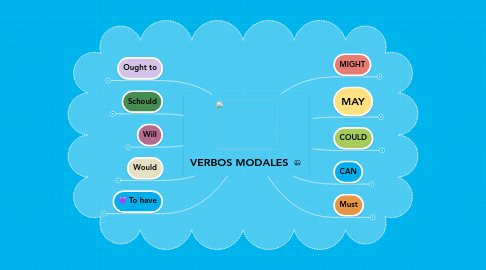
1. Ought to
1.1. El verbo 'ought to' es igual al 'should' y expresa una obligación débil. Significa debería, tendría que.
1.1.1. Affirmative: Sujeto+ ought to+verbo+complemento
1.1.1.1. Ejemplo: I ought to stay in bed. Yo debería quedarme en la cama.
1.1.2. Negative: sujeto+ought not to+verbo+complemento
1.1.2.1. Ejemplo: George ought not to wear someone else's glasses. George no debería usar los anteojos de otra persona.
1.1.3. Interrogative: Ought+sujeto+to+verbo+complemento?
1.1.3.1. Ejemplo: Ought they to live there? ¿Deberían ellos vivir allí?
2. Schould
2.1. “Should” indica una obligación o recomendación. Refleja una opinión sobre lo que es correcto. Se traduce como el condicional de “deber” en español.
2.1.1. Affirmative: Sujeto+ should+verbo+complemento
2.1.1.1. Ejemplo: We should go to sleep. Deberíamos ir a dormir.
2.1.2. Negative: sujeto+should not+verbo+complemento
2.1.2.1. Ejemplo: Nick shouldn't be working. Nick no debería estar trabajando.
2.1.3. Interrogative: Should+sujeto+verbo+complemento?
2.1.3.1. Ejemplo: Should I write Maggie a letter? ¿Debería yo escribirle una carta a Maggie?
3. Will
3.1. En inglés no existen los verbos en futuro, sino que al agregar will, convertimos en futuro al verbo que le sigue
3.1.1. Affirmative: sujeto+will+verbo+complemento
3.1.1.1. Ejemplo: I will call you back. Yo te volveré a llamar.
3.1.2. Negative: sujeto+will not+verbo+complemento
3.1.2.1. Ejemplo: They will not come. Ellos no vendrán.
3.1.3. Interrogative: Will+sujeto+verbo+complemento?
3.1.3.1. Ejemplo: Will you take me with you? ¿Me llevarás contigo?
4. Would
4.1. 'Would' es el pasado de will en algunos casos y verbo auxiliar en otros. Convierte en potencial al verbo que le sigue y va seguido del verbo en forma base.
4.1.1. Affirmative: Sujeto+ would+verbo+complemento
4.1.1.1. Ejemplo: I would go to the party. Yo iría a la fiesta.
4.1.2. Negative: sujeto+would not+verbo+complemento
4.1.2.1. Ejemplo: She would not be happy. Ella no sería feliz.
4.1.3. Interrogative: Would+sujeto+verbo+complemento?
4.1.3.1. Ejemplo: Would he give Patty a diamond ring? ¿Él le daría a Patty un anillo de diamantes?
5. To have
5.1. El verbo 'to have' tiene en español el significado principal de 'tener' y 'haber'. Puede tener también otros significados, como 'tomar'.
5.1.1. Affirmative: Sujeto+ Have/has+verbo+complemento
5.1.1.1. Ejemplo: I have to play basketball
5.1.2. Negative: sujeto+do not have to+verbo+complemento
5.1.2.1. Ejemplo: You do not have study English
5.1.3. Interrogative: Do/ does+sujeto+have/has+verbo+complemento?
5.1.3.1. Ejemplo: Do I have a computer?
6. MIGHT
6.1. Se usa “might” para indicar posibilidades en el presente o el futuro. En estos casos, es un sinónimo de “may”.
6.1.1. Affirmative: sujeto+might+verbo+complemento
6.1.1.1. Ejemplo: I might lose my job. Podría perder mi trabajo.
6.1.2. Negative: sujeto+might not+verbo+complemento
6.1.2.1. Ejemplo: It might not rain tonight. Puede que no llueva esta noche.
6.1.3. Interrogative: Might+sujeto+verbo+complemento?
6.1.3.1. Ejemplo: Might we speak to you for a moment? ¿Podríamos hablar contigo un momento?
7. MAY
7.1. Se utiliza para expresar cierto grado de probabilidad de una acción o grado de certeza: It may rain today. Significa: podría, quizás, puede que.
7.1.1. Affirmative: Sujeto+May+verbo+complemento
7.1.1.1. Ejemplo: We may stay here for the night. Podríamos pasar la noche aquí.
7.1.2. Negative: Sujeto+not may+verbo+complemento
7.1.2.1. Ejemplo: You may not leave the classroom without permission. Usted no puede salir del aula sin permiso.
7.1.3. Interrogative: May+sujeto+verbo+complemento?
7.1.3.1. Ejemplo: May I have a glass of water? ¿Podría tomar un vaso de agua?
8. COULD
8.1. el verbo 'could' expresa poca probabilidad o condicionalidad. significa: podría, pude, podía, pudiera de acuerdo con el contexto
8.1.1. Afirmativa: Pronombre+could+forma base del verbo principal+complemento
8.1.1.1. Ejemplo: Luis could play the guitar
8.1.2. Negativa: Pronombre+not could+forma base del verbo principal+complemento
8.1.2.1. Ejemplo: Mrs. Jones couldn't stand the smell. La señora Jones no pudo/podría soportar el olor.
8.1.3. Interrogativa: could+pronombre+ forma base del verbo principal + complemento
8.1.3.1. Ejemplo: Could you open the window? ¿Pudiste/podrías abrir la ventana?
9. CAN
9.1. El verbo "can" significa que algo es posible (posibilidad) o que alguien es capaz de hacer algo (habilidad). Este verbo se utiliza siempre acompañado de un verbo principal en su forma infinitiva.
9.1.1. Affirmative: sujeto+can+verbo+complemento
9.1.1.1. Ejemplo: I can play the trumpet. Yo puedo/sé tocar la trompeta.
9.1.2. Negative: sujeto+can not+verbo +complemento
9.1.2.1. Ejemplo: I can not swim. No puedo/sé nadar.
9.1.3. Interrogative: Can+sujeto+verbo+complemento?
9.1.3.1. Ejemplo: Can you help me with my homework? ¿Me puedes ayudar con mi tarea?
10. Must
10.1. El verbo 'must' expresa una prohibición u obligación fuerte así como cierta certeza: I must go. She must be crazy. En español significa debo, debo de.
10.1.1. Affirmative: sujeto+must+verbo+complemento
10.1.1.1. Ejemplo: I must go to the library. Debo ir a la biblioteca.
10.1.2. Negative: sujeto+must not+verbo+complemento
10.1.2.1. Ejemplo: Mr. Williams must not smoke. El señor Williams no debe fumar.
10.1.3. Interrogative: Must+sujeto+verbo+complemento?
10.1.3.1. Ejemplo: Must you go so soon? ¿Debes irte tan pronto?
